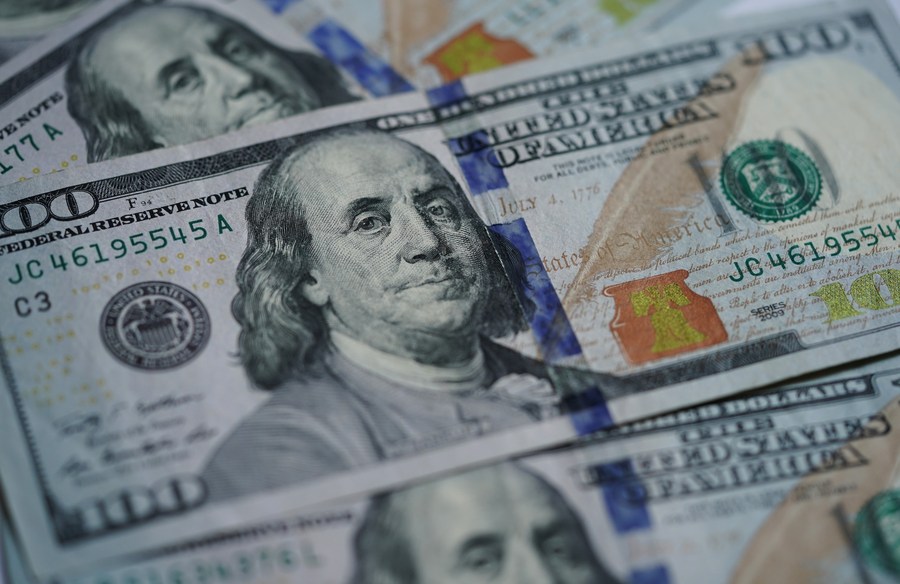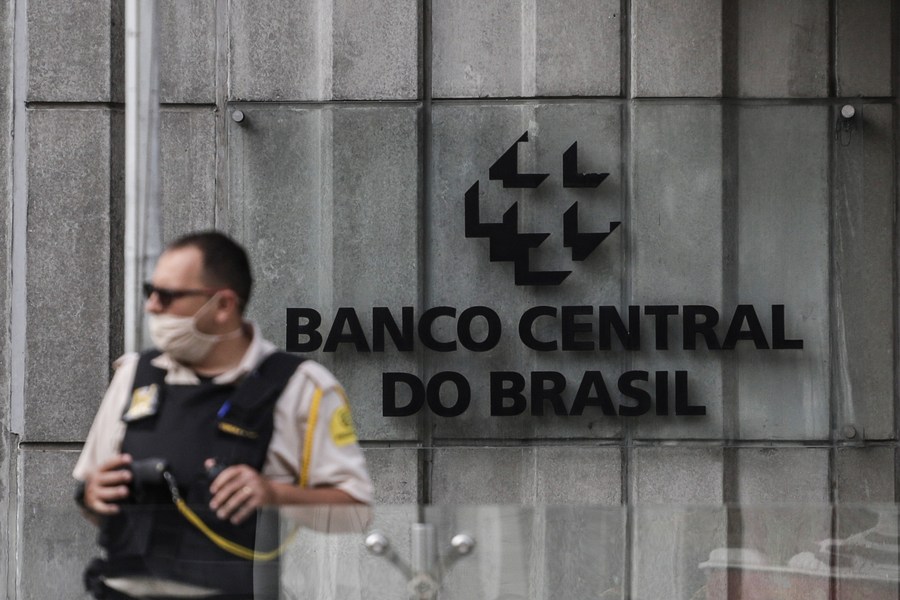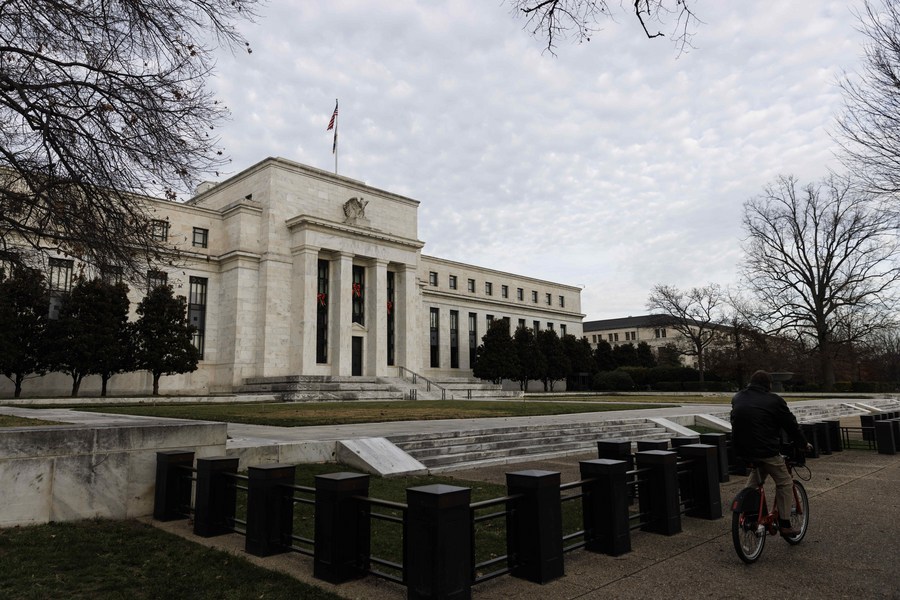
Photo taken on March 17, 2020 shows U.S. dollar banknotes in Washington D.C., the United States. (Xinhua/Liu Jie)
While Washington cheered its economic development and preached about its system around the world, the untold story is that its path to hegemony was partly paved by means of precipitating debt crisis in emerging markets.
BEIJING, Jan. 25 (Xinhua) -- In his bestseller Confessions of an Economic Hit Man, John Perkins expounded how he was employed by a U.S. company to talk world leaders into accepting U.S. substantial infrastructure loans and trapped them in "a web of debt that ensures their loyalty."
As the book has suggested, the debt trap is nothing new, but sees its history run back to the last century, if not even earlier, and though debtors varied in different cases, the real culprit of virtually every crisis was the United States.
Whether it be intended by Washington or not, the debt crises elsewhere did help the United States ascend all the way to become a global superpower. These ill-gotten gains at the cost of crisis-hit developing economies, as well as the U.S. ploys behind them, did not go unnoticed. Instead, criticisms have abounded globally for decades, mainly leveled at the U.S. costly attempts to maintain its hegemony by plundering and manipulating other economies.

A Wall Street sign is seen in front of the New York Stock Exchange (NYSE) in New York, the United States, on Jan. 18, 2022. (Xinhua/Michael Nagle)
HEGEMONY VIA DEBT
While Washington cheered its economic development and preached about its system around the world, the untold story is that its path to hegemony was partly paved by means of precipitating debt crisis in emerging markets.
As a result of Western colonialism and imperialism, debt traps happened as early as the 19th century, research shows.
For creditors, debtors' dependency proved lucrative. "Fluctuating commodity prices, inflationary pressures, and collapsing local currencies were among the causes of the surge in national indebtedness of which Western creditors took advantage to carve out concessions and market share in Latin America," said a paper published by the London School of Economics and Political Science in 2020.
When Washington gained more leverage when ascending to its hegemony, it prompted a system that tightened its grip in global finance but further caused injustice for the developing world. Commenting on the G8 summit in July 2000, Guardian columnist George Monbiot said that the United States "was the world's major creditor and wanted to keep it that way."
The United States established "a global trading system which secured both a lasting U.S. economic hegemony and the irredeemable indebtedness of poorer nations," Monbiot noted.

A security guard wearing a face mask stands by the building of Brazil's central bank in Sao Paulo, Brazil, on June 25, 2020. (Xinhua/Rahel Patrasso)
TRAPPED LATIN AMERICA
Latin America has frequently been referred to as a victim of the debt inflicted by its neighbor. In the 1970s, many countries in the region borrowed from a large group of creditors led by U.S. commercial banks with near-zero real rates of interest. Years later, however, the United States and Europe tightened their monetary policies, and the debtors soon found their burdens unsustainable.
When the crisis was brewing, Washington "was in the forefront in urging the banks to invest in Latin America, in bringing together lenders and buyers, in finding useful investment possibilities and, in some cases, in guaranteeing the investments made," said a research paper in 1992 by experts from Loyola University Chicago. "The United States must surely shoulder a portion of the blame" about the crisis.
In 1989, when the Third World debt crisis entered its seventh year, it became abundantly clear what Washington was plotting. There were "several ways that U.S. policymakers have sought to use the current crisis to partially revive U.S. hegemony and reverse Third World challenges to that hegemony that became increasingly obvious in the decade of the 1970s," said James M. Cypher, a professor at California State University Fresno, in a study that year.
Today, worries mounted once again across Latin America over yet another possible shock wave sent by Washington as the Federal Reserve is considering raising interest rates in 2022 to contain domestic inflation, reported El Pais, a Spanish daily, in December 2021. A rise in rates, it said, could see the interest rates of the debt in the region go up and make the countries' hard currency debt harder to pay.

Photo taken on Dec. 15, 2021 shows the U.S. Federal Reserve in Washington, D.C., the United States. (Photo by Ting Shen/Xinhua)
MORE EASY PREY
While the Latin American case was under scrutiny, experts have warned the U.S. shock is largely a global phenomenon. "Given its financial ascendancy, the United States is uniquely able to externalize its economic crises on other economies, particularly those of the global South," said John Bellamy Foster, a professor at the University of Oregon, in 2015.
In Asia, the debt problem loomed. "The United States through the lending agencies has been forcing Pakistan to toe its military and foreign policy designs against the interest of humanity at large," said Ikramul Haq, a scholar in Pakistan, in a 2003 book.
Washington also attempted to expand its clout through debt in Africa. "Debt provides a powerful lever for forcing the third-world 'adversary' to submit to the will of the creditors," said an article by the Transnational Institute, a think tank in Amsterdam, in 1992.
For decades, therefore, "we build a global empire," said Perkins, the American author. As economic hit men tried to bankrupt the countries that received loans, he added, the debtors "would present easy targets when we needed favors, including military bases, UN votes, or access to oil and other natural resources." ■












